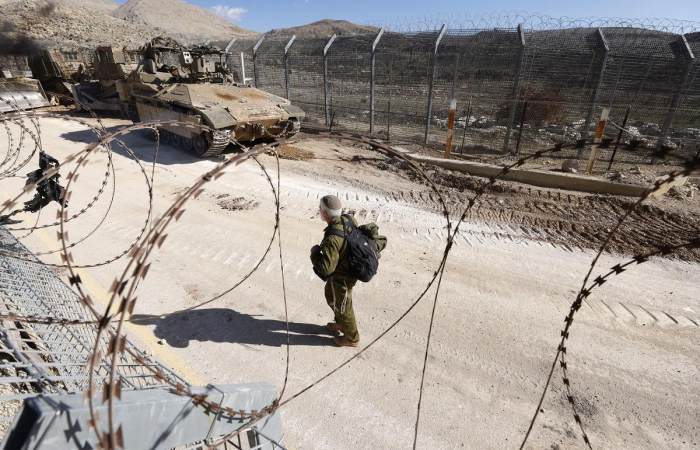In the last few days, the EU and the UK took the first public steps to censure Israel for its actions in Gaza. It was done ever so gently that one could not be blamed for not noticing, but politically it was a seismic step taken after much consideration and soul-searching, and it will have long-term implications. But for many, it is too little, too late. Gaza is a tragedy that the West has been unable to prevent. It will haunt the West, particularly Europe for a long time to come.
Gaza today, the Hamas attack and the Israeli response
For a long time, Gaza has been a large, overpopulated prison, its two and half million Palestinian inhabitants boxed in by the Israelis. It became an easy target for Hamas, a group which articulated its plans in Islamist discourse and Palestinian nationalist rhetoric. In 2007 Hamas seized power in Gaza, and dug in, literally. An elaborate system of tunnels hid Hamas' movements and activities from the prying eyes of the Israelis. Like every prisoner in any prison, the Palestinians of Gaza dreamed of breaking out. They did in the most dramatic way possible, on 7 October 2023, but unlike any prisoner that escapes from a high-security prison, the Palestinians that came out of Gaza had nowhere to hide, and they knew they were destined to return to their prison. They resorted to an orgy of senseless killing, including of many civilians, until they returned to their prison with many hostages. The world was rightly outraged, and knew that the Israelis would respond. The Israeli response has gone on ever since. Under Netanyahu, the Israeli state has made everyone and everything in Gaza a target. It has broken every rule and every convention. And it is not finished yet. Europe, still gripped by the collective guilt of the holocaust, was impotent to react decisively.
The collective guilt of the Nazis, and the holocaust that killed six million Jews
It is difficult to explain to non-Europeans the collective guilt felt in Europe, and particularly amongst the political elite in the EU and UK, about the Holocaust. Eighty years after the end of WWII and the collapse of the Nazi regime, Europeans, regardless of whether they come from countries that embraced Nazism, such as Germany or Austria, or had fought against it, like the UK and Poland, still have a guilt complex. It was one of the most outrageous events in the history of humankind, and Europeans did it, or failed to stop it.
Years ago, I was in Iran, at a time when we thought we could still talk with the Iranians. One of the senior Iranian officials I met, started to talk to me about the Holocaust, and said it was all propaganda, and it did not happen. I got very angry, and told him that we don’t need him in Tehran to tell us what happened to the Jews in Europe. Europeans did it and we know it. Later when thinking about the incident, I realised that I also suffered from a sense of guilt, even though neither I, nor my ancestors, had any connections with the Nazis, on the contrary.
Western countries, and particularly the political elites in Europe remain highly sensitive on this issue. The mood is changing amongst young people. Gaza is becoming what Vietnam was for young people in the 1960s. But it is a different dynamic, and we have yet to see the end of this story.
Israeli misguided policy has failed
The policy of the Israeli government, led by Benyamin Netanyahu, to wipe out Gaza, is misconceived not least because, despite its harshness, it is bound to fail. The death toll amongst Palestinians in Gaza has reached nearly seventy thousand including many children and more than a hundred thousand have been injured. The entire population is on the verge of starvation. Amnesty International, in its report on 5 December 2024, says that “there is sufficient evidence to believe that Israel’s conduct in Gaza following 7 October 2023 amounts to genocide”. In its report on 24 March 2024, Francesca Albanese, UN Special Rapporteur on the Occupied Palestinian Territories, says that “there are reasonable grounds to believe that the threshold indicating that Israel has committed genocide has been met”.
Israel has decapitated the leadership of Hamas, and destroyed its arsenals. Yet it has not destroyed the will of the Palestinian people to resist. Israel has changed the problem but has not resolved it. In the meantime, the Israeli people who elect Netanyahu, and the Jewish Communities throughout the world that give him succour, cannot wash their hands of this situation.
Palestinian lack of leadership after Arafat
Yasser Arafat was a mercurial leader who could be different things to different people. But for the decades he led the Palestinian nation he offered some measure of identity and cohesion to the Palestinians. He kept the Arab leaders on their toes, and was a difficult but dynamic interlocutor with the Western countries. For the Israelis, he was a pain in the side, but for the time he was there, they knew there was someone who they could talk to, and who carried weight across the Palestinian nation. In his last years, Arafat deteriorated substantially but for most of the time he provided the Palestinians with leadership and identity. The Palestinian leadership of today has neither the charisma, nor the moral authority nor the sway of Arafat. This was seen clearly in the Gaza crisis. Gaza has however deeply affected the whole Palestinian nation: in Gaza, on the West Bank and the millions of Palestinians spread all over the world. What will emerge is still too early to say, but Israel and the world will have to deal with a post-Gaza Palestinian leadership that is less compliant.
The Arabs
The time when the Palestinian issue dominated the foreign policy, and sometimes even the domestic policy, of the Arab countries has long gone. But that does not mean that it is no longer relevant. Sometimes it is embraced to give legitimacy, as for example in Yemen under the Houthis. But all Arab countries are aware that a pro-Palestinian feeling is predominant in their societies. In the UAE, the normally compliant Federal Supreme Council representing the seven rulers, saw a rare moment of opposition by one, when the issue of establishing diplomatic relations with Israel was discussed. Throughout the Arab world outrage at Israeli actions has been high. Gaza has awakened many sleeping demons, and in time we will see the consequences.
The West – the Americans and the rest
Up to now, the US has taken the lead in the Middle East and the rest of the West followed. Under Donald Trump it is different, and the United States has lost the moral authority to lead. Trump made his first overseas trip to three Gulf monarchies: Saudi Arabia, Qatar and UAE. Trump was too busy announcing multi-billion dollar deals – or was it multi-trillion – to think or talk about Gaza or Israel. In other fora he has spoken about moving the whole population of Gaza out – a notion condemned by the Palestinians and everyone else. But Trump is not ready to sacrifice any political capital for Israel, for the Palestinians, or for anyone else in the Middle East unless they can talk the language of trillions.
A unique opportunity for Europe to lead – but the baggage of history may prove too heavy
On paper, the current situation offers a unique opportunity for Europe to lead. Most EU countries support the two-state solution, and some have even recognised a Palestinian state including Sweden, Cyprus, Hungary, Czechia, Poland, Slovakia, Romania, Bulgaria, Spain, Ireland, Norway, and Slovenia. On 20 June there will be a conference in New York on the margins of the United Nations, convened by France and Saudi Arabia. It is expected that a number of other European countries will recognise the Palestinian state. This is largely a symbolic gesture, but necessary if European endorsement of a two-state solution is to be credible.
But Europe has failed to push Israel enough on the matter of Gaza. Its tacit acquiescence to Israel’s Gaza policy has made it, in the minds of some, an accomplice. The baggage of history continues to be too heavy.
It is late but better late than never. If what is happening in Gaza is genocide, then Europe must move decisively to stop it. Otherwise, Gaza will haunt Europe for many years to come.






